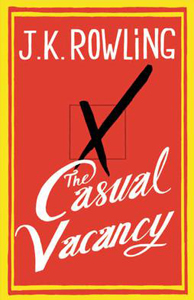After completing the seven-book “Harry Potter” series, J.K. Rowling branched into adult novels with 2012’s “The Casual Vacancy,” and it could serve as a guide for the difference between YA and adult novels. It goes deeper than the addition of swearing and sex. Whereas Harry, Voldemort and company generally fit into boxes of good and evil, the characters in Pagford and Yarvil (think Springfield and Shelbyville, but in Britain) aren’t so cut and dried.
The title refers to the opening on the town council created by the death of Barry Fairbrother. The upcoming election provides a plot, but this isn’t a plot-centered book. Instead, Rowling explores the mundanity of good and evil via dozens of characters who cross each other’s paths, often reluctantly. She harshly reminds us that the real world doesn’t have Campbellian hero’s journeys.
Rather, random chance seems to be a big player in the events of “The Casual Vacancy,” starting with Barry dropping dead of a brain aneurysm in his 40s. Pagfordians of all ages and classes – their interest in the election ranging from serious to absolutely none — then proceed to live their small lives. But they are big lives to them, of course.

“The Casual Vacancy” (2012)
Author: J.K. Rowling
Genre: Small-town character drama
Setting: 2012; Pagford and Yarvil, England
Tragic lives, in miniature
As we bounce among pathetic and sympathetic characters in the literary equivalent of a Todd Solondz film, Rowling achieves a compelling tone of ongoing and imminent tragedy. People only have access to their inner thoughts, combined with hopes about other people. We’re often privy to their false assumptions, so It’s like watching a chain reaction of non-fatal, mildly cringy motor accidents – almost going full “butterfly effect” near the end.
Love feels like a tempting escape path, but it might be the biggest of false hopes. Lawyer Gavin finds himself falling for the widowed Mary, and student Andrew’s thoughts are caught up in pretty new student Gaia. Student Fats aims to live an “authentic” life of doing whatever he feels like, but meanwhile girlfriend Krystal desperately wants to get pregnant to rise from brutal poverty to tolerable poverty.
Married couples don’t have things much better than the lovelorn. An Indian-English couple have an arranged marriage, and the traditional marriages have settled into unspoken, unloving arrangements. In an amusing/sad thread, Samantha gradually becomes obsessed with her teen daughter’s favorite boy band. Aging does not equal maturity in Pagford the way it seems to at Hogwarts, with its McGonagalls and Dumbledores.
While the situations are familiar – with Rowling particularly interested in showcasing the value of methadone clinics in the battle against drug abuse (or at least showing it’s better to have them than to not have them) – several of “The Casual Vacancy’s” characters have no literary parallels who jump out.
Colin, for instance, has a brutal combination of OCD and anxiety where he believes he will do something horrible and face consequences for it – even though he has never done any of the horrible things he fears.

A ghost of a chance
The most memorable character is Krystal, who speaks in a hick accent spelled out phonetically by Rowling, a trick the author would later employ when developing quirky witnesses and suspects in her “Cormoran Strike” mysteries. We feel the weight on the shoulders of a teen whose junkie mom is worthless, who has to take care of her kid brother, and who also has to deal with school. Oddly, a job is never mentioned; that may or may not be purposeful by Rowling.
Moments of lightness creep into the narrative via absurdist humor. “The Ghost of Barry Fairbrother” begins posting on the council message boards, and we know the simplest of website security measures could stop this, but council leader Howard is too arrogant and preoccupied to even look into that.
Before learning the title’s meaning, I had the notion that “Casual Vacancy” would be a light farce – the cover designer is playful with the fonts – but it’s not that. It’s not the darkest story ever; I don’t feel crushed after reading it. But it is a melancholy book, largely because Rowling achieves a remarkable level of grounded honesty in her first exploration about how workaday people live.
It’s bookended with deaths, and the pages in between are about struggles and hopes that are not always realized. It has a stark villain in Simon, who beats his sons, who have no way to level the playing field like Harry gradually did against the abusive Dursleys.
Appreciation only after death
Barry, perhaps by being dead, is the most likable, positive character. Another character has their most triumphant moment told in a flashback after a funeral that is much more glorious than their life. But we sense that Barry was human; he could stick his finger in the dam, but no single human – and certainly not via politics – can save these ridiculous Pagfordians.
Indeed, I love how the election gradually matters less and less as the story moves forward. The result is given in one sentence, and by this time, we don’t even care. Rowling has made the point that it doesn’t much matter.
Although “The Casual Vacancy” might go down as her oddball one-off novel between the seven “Potters” and the (currently) seven “Cormoran Strikes,” I bet the author’s notebooks for this one are just as much filled with lovingly detailed character backstories.
“The Casual Vacancy” is a bittersweet achievement, as Rowling thoroughly examines life in a world without magic. Even though Rowling starkly lays things out rather than making authorial judgments about people’s merits and relative value, her compassion carries over from when she was writing possibility-laden epic yarns for imaginative teens.
Rowling doesn’t know how to help the Krystals of the world – those who have taken life’s harshest blows at far too young an age — when there’s no Potter-esque path laid out. But she at least sees them. The “Potters” showcase her imagination, and “The Casual Vacancy” shows that she very much understands the real world, too.

